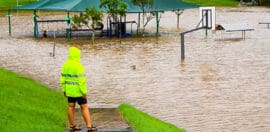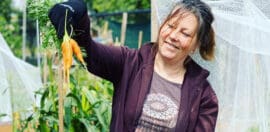Funding climate justice

15 February 2023 at 3:57 pm
Climate justice demands that communities of privilege who have benefitted the most from using fossil fuels do the bulk of the heavy lifting to reduce emissions and to fund solutions tackling climate change, Jessica Bineth writes.
When we talk about mitigating the worst impacts of the climate crisis, climate justice is increasingly a solution activist organisations are building into their mission statements and strategies. This is based on the growing understanding that those hit hardest will mostly be the people who have done the least to cause the problem in the first place.
In Australia this means First Nations communities, many who are living on the frontlines of climate change and are already experiencing worsening impacts on Country and culture.
Climate justice demands that communities of privilege who have benefitted the most from using fossil fuels do the bulk of the heavy lifting to reduce emissions and to fund solutions tackling climate change.
But this is not just about fairness. It’s crucial that the voices of those most affected by the climate crisis are amplified, listened to and centred in the formulation of climate change policies and mitigation strategies. After all, under the care of First Nations people this place thrived. We have much to learn from their knowledge and experience, tried and tested over tens of thousands of years, including through climatic shifts of the past.
While there’s growing recognition of the vital need for traditional ecological knowledge, this acknowledgement has yet to be properly translated into tangible action. In the climate change space the voices of Indigenous leaders go largely unheard and at a grassroots level First Nations led solutions are chronically underfunded, which is a huge loss for our climate ambitions.
This is something Groundswell has set out to remedy. In 2021 we hosted a roundtable discussion with our First Nations advisors and members. So many great ideas were generously shared that day, but one piece of feedback we knew we needed to act on immediately had to do with our grantmaking framework. It leaned too heavily on the mainstream definition of climate advocacy – a definition too narrow to include many of the things First Nations communities do to protect Country.
Excited by the opportunity to create a new and more accessible model of grantmaking, our First Nations Director Lille Madden created the Caring for Country grant round. Open to Aboriginal, Torres Strait Islander and Pacific Islander people working towards climate justice, it celebrates the cultural knowledge and understandings that are still being practised today and are a fundamental and urgent climate solution.
In our opening grant round at the end of last year we received 29 applications. Taken together, they tell a story of the abundance of Indigenous ingenuity when it comes to combating the climate crisis. In this first round, six groups will receive $40, 000 and four groups will receive $10, 000 in funding. This investment in stewardship and reciprocity between people and the environment will strengthen language and social connection between elders and younger generations; help facilitate the sharing of stories, songlines and knowledge; and maintain a connection to Country.
Essential to getting this initiative off the ground was the support of the Eisen Family Private Fund, which provided an initial $160,000 multi year commitment. We wanted this grant round to be led, designed and distributed by First Nations people and the Eisen family supported this vision right from the start. Since then we’ve facilitated a new partnership with the Oranges & Sardines Foundation and conversations with other potential philanthropic partners are underway. These relationships, built on a commitment to authentic self-determination, are amplifying First Nations leadership at a time when it’s most needed.
Crucial to developing a strategy that would have a positive outcome for both applicants and the environments they protect was the extensive consultation we did initially with our First Nations members and advisors. The most heartwarming part of this whole process has been connecting with new community members, learning about what they care about and are working to protect, and how they are empowering their communities to get involved too.
By supporting Aboriginal, Torres Strait Islander and Pacific Islander people, we are supporting culture and Country to remain healthy and strong – not only for us, but for future generations too. The stakes for taking action on climate change couldn’t be higher and there isn’t time to be holding back, so in 2023, Groundswell’s goal is to back even more First Nations led organisations leading the way for climate justice.
If you’re interested in supporting the Caring for Country grant round, please get in touch with Arielle Gamble.







